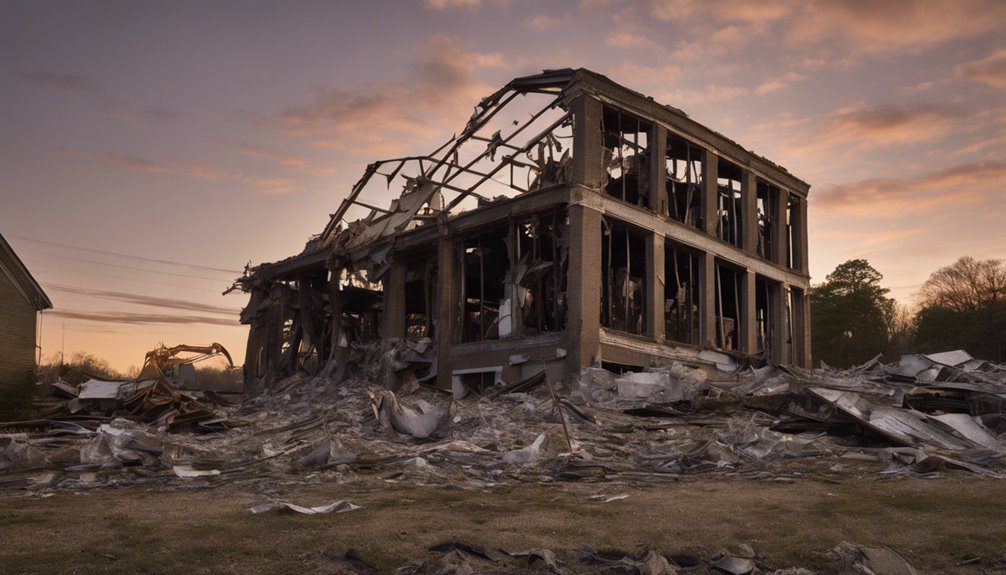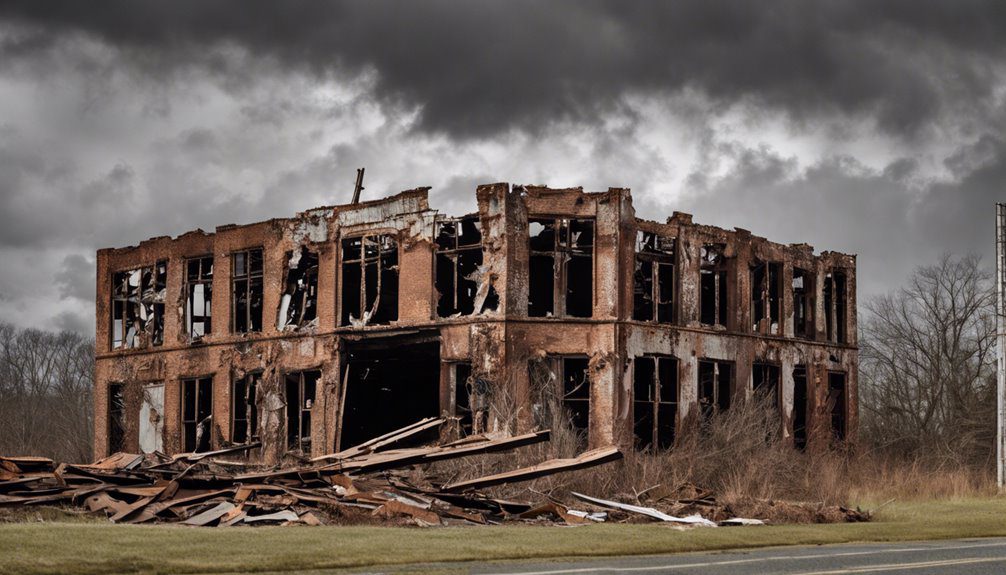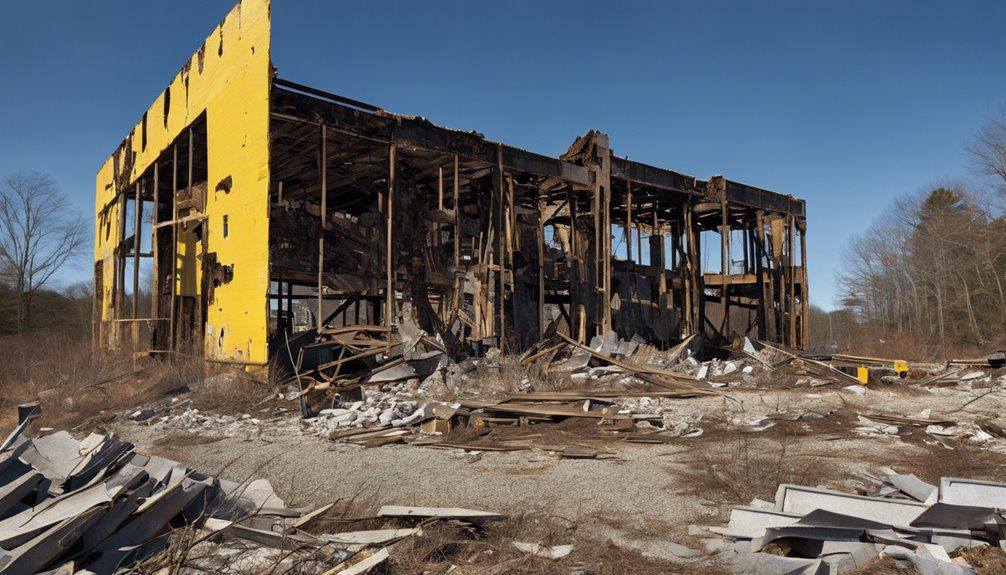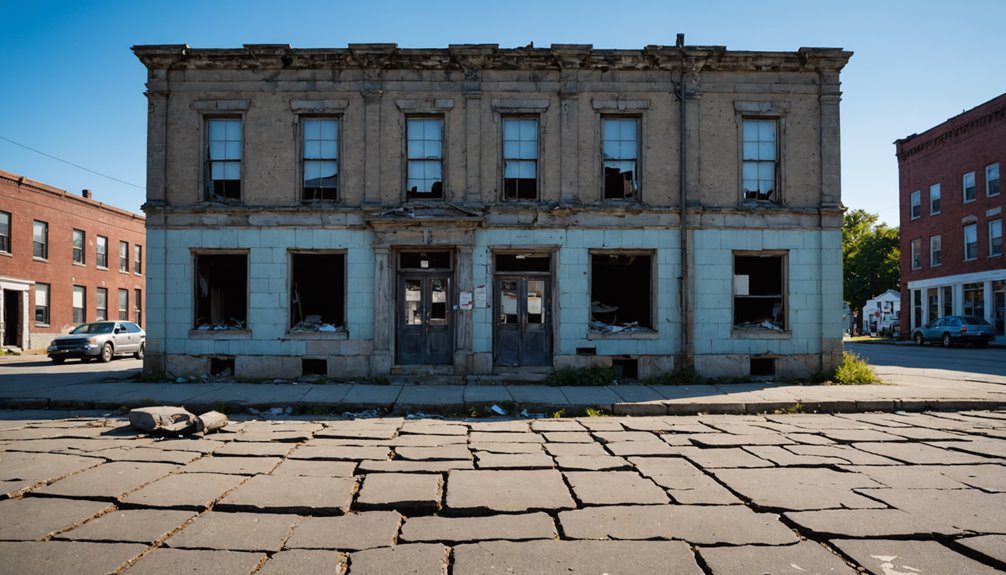If you're considering a demolition project in Coventry, RI, understanding the role of a demolition bond is crucial. This bond not only safeguards compliance with local regulations but also serves as a financial security for unexpected incidents during the demolition. You'll find that securing a bond can elevate your project's credibility and help you navigate the permitting process more smoothly. But what specific steps do you need to take to obtain this bond, and what costs might you encounter along the way? The answers could significantly impact your plans.
What Is a Demolition Bond?

A demolition bond is a type of insurance that protects local governments and property owners during the demolition process. When you engage in demolition activities, this bond ensures that you'll comply with local regulations and guidelines. It acts as a safety net, covering potential costs that arise from accidents or violations related to the demolition site.
When you obtain a demolition bond, you're essentially providing a guarantee to the local government that you'll fulfill your obligations. If you fail to meet the requirements, the bond can cover any financial losses incurred by the government or affected property owners. This means you should take the bonding process seriously, as it reflects your commitment to safety and adherence to regulations.
In Coventry, RI, securing a demolition bond is a crucial step before commencing any demolition work. You'll need to coordinate with local officials to ensure you meet all necessary criteria.
Importance of Demolition Bonds
Understanding the importance of demolition bonds is essential for anyone involved in construction or renovation projects. These bonds serve as a financial safety net, ensuring that you adhere to local regulations and complete the demolition process responsibly.
If something goes wrong—like environmental damage or injuries—your bond provides a way for affected parties to seek compensation without additional legal hassles.
By securing a demolition bond, you demonstrate your commitment to following safety guidelines and city ordinances. This not only helps you avoid hefty fines but also enhances your reputation in the industry. Clients and partners will feel more confident working with you, knowing you've taken the right steps to mitigate risks.
Furthermore, a demolition bond can be a requirement for obtaining necessary permits. Without it, you might find yourself unable to proceed with your project, leading to delays and increased costs. Additionally, these bonds are crucial for ensuring compliance with state laws, which helps protect both your business and the community.
Types of Demolition Bonds

When diving into the world of demolition bonds, you'll come across several types tailored to different needs and projects. The two primary types are performance bonds and payment bonds.
A performance bond ensures that the demolition contractor fulfills their obligations according to the contract terms. If they fail to complete the project or meet standards, the bond covers the costs incurred to hire another contractor to finish the job. This type of bond offers you peace of mind, knowing your project will be completed as planned.
On the other hand, a payment bond guarantees that subcontractors and suppliers get paid for their work and materials. If the contractor defaults on payments, this bond protects those parties, ensuring they receive compensation. This bond is essential for maintaining a smooth workflow and preventing delays caused by payment disputes.
Additionally, some municipalities may require a specific type of bond, such as an environmental bond, which ensures compliance with local regulations regarding hazardous material disposal. Understanding these different types of demolition bonds can help you choose the right one for your project, ensuring compliance and minimizing financial risk. Furthermore, having a performance bond in place can significantly protect the owner from contractor default, providing an added layer of security for your investment.
How to Obtain a Demolition Bond
Navigating the process of obtaining a demolition bond can seem daunting, but it's straightforward with the right steps.
First, you'll want to gather the necessary documentation. This typically includes proof of your business's financial stability, project details, and any required licenses or permits. Having these documents ready will streamline the application process.
Next, you'll need to choose a reputable bonding company. Research various providers and compare their terms, conditions, and customer reviews. Once you've selected a company, reach out to them for an application form. Fill it out carefully, ensuring all information is accurate and complete.
After submitting your application, the bonding company will conduct a thorough review. They'll evaluate your financial standing, experience, and the specifics of your demolition project. Be prepared to provide additional information if requested.
Once they approve your application, you'll need to sign the bond agreement. Make sure you understand all terms before signing.
Costs Associated With Demolition Bonds

After securing your demolition bond, it's important to consider the costs involved. The total expenses can vary significantly based on several factors, including the bond amount required, the type of project, and your credit history.
Typically, the bond premium ranges from 1% to 15% of the bond amount, which means if your bond is $50,000, you might pay between $500 and $7,500.
You should also account for any additional fees that may arise during the bonding process. These could include administrative fees, underwriting fees, or even costs associated with inspections or legal documents.
If you need to improve your credit score to secure a better rate, consider the time and effort that entails as an indirect cost.
Additionally, don't forget about potential costs related to compliance and project delays. If your demolition project faces unexpected challenges, such as environmental concerns or local opposition, you could incur extra expenses that extend beyond the bond itself. Understanding these costs upfront will help you budget effectively and prevent surprises down the line. Moreover, having the right contract bonds can further streamline your bonding process and mitigate unexpected expenses.
Compliance and Regulations in Coventry
Compliance with local regulations is crucial for any demolition project in Coventry. You need to familiarize yourself with the town's specific requirements, as failing to adhere can lead to delays, fines, or even legal issues.
Start by checking with the Coventry Building Department to understand the necessary permits. You'll typically need a demolition permit, which ensures that your project meets safety and environmental standards.
Next, consider the environmental regulations that apply to your project. Asbestos removal, for instance, requires special handling and disposal processes. If your building contains hazardous materials, you'll need to hire a licensed contractor trained in safe removal practices.
Additionally, you must notify local utilities before beginning demolition. This step ensures that gas, water, and electricity are safely disconnected, minimizing risks during the demolition process.
Conclusion
In Coventry, obtaining a demolition bond is crucial for your project's success. It not only ensures compliance with local regulations but also protects you and the community from potential liabilities. By securing a bond, you demonstrate your commitment to safety and professionalism, which can enhance your reputation as a contractor. So, whether you're a property owner or a contractor, don't overlook the importance of a demolition bond in your next demolition project.


